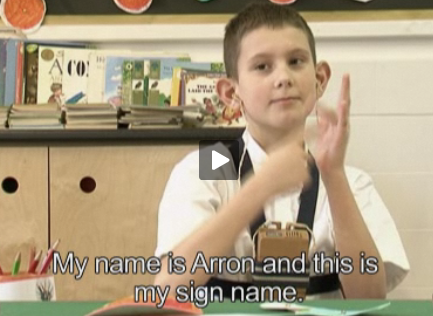All,
Another short film written and directed by Ted Evans, from Great Britain. All in British Sign Language with voiceover, with open captions.
Click this image below, and it’ll take you to the British Sign Language Broadcasting Trust (BSLBT) website. The short film is there.
Synopsis
Starting in the 1980’s, drama ‘The End’ follows 4 Deaf children over 60 years. After the introduction of a treatment aimed at eradicating deafness, the very survival of Deaf language and culture is at stake. Featuring stunning visual effects and an ensemble cast, ‘The End’ is a thought-provoking alternative vision of the future. This film is less than 25 minutes long.
The ending of the show is really a bone-chilling moment for me. Yes, it is a thought-provoking! If these medical professionals really want to see the end result like this, then I really have a hard time to express how I am feeling, except, I thought up of this quote:
“Life Imitates Art or Art Imitates Life?”
I suggest you to watch and share with your friends. Feel welcome to leave a comment here.
Best,
Amy Cohen Efron


7 comments on “The End (Film by Ted Evans)”
Dianrez
Chilling, indeed, and hypothetical in a very Hearing perspective way. Nothing in the film rationally supports staying Deaf at all except in a very shallow, token, lip-service way. Not even considered is the cultural mindset: most of us would still retain a cultural sense and preserve our Deaf community even if magically we all could become hearing.
I felt that the same subject written by culturally Deaf people would have greater depth and explore more the feelings of separation that exists even among those who have been implanted early and have otherwise done fairly well. Rather, this film reminds me of another film “Ishi: The Last Yahi” (http://www.imdb.com/title/tt0104531/synopsis) which was about the last surviving Indian of his tribe.
In all, this film is telling us to be fixed and assimiliate or die of terminal loneliness. Progress, you know. Simplistic.
Don G.
Interesting, D-rez. I had a different take on it. I thought the producer was Deaf, and was trying to illustrate the cultural genocidal component of genetic therapy on Deaf people.
I do agree with you that it could have been a bit better done — explore the cultural elements and show more of how even though those Deaf were “cured”, they were still behind in academic and communicative areas, and maybe had a harder time “fitting in” to Hearing ways, and so on.
Judith weeks
Interesting comments and thought provoking but I think you may be missing the point that this is a drama not a documentary on deafness.
Like many good dramas, I was moved emotionally, especially by the final scene.
Like other good dramas, It also lead me to think about the wider implications around the issues raised by this film.
For example…..that bit ‘Deaf people are beautiful’ made me think with sadness about the potential loss of any one who was seen as different.
Nigel Rogers
I was touched. I don’t want to watch it again. Tell you, I once had a disabled cousin. He couldn’t hear, couldn’t see, couldn’t speak. He was 12 but he was lying on bed like a baby. Fed like a baby. Cared like a baby. Loved like a baby. He died because of multiple organ failure. I am missing him.
David
I had a brother with disabilities, died in hospital where he lived, at 15. I think nowadays there are way to many possibilities to check before giving birth if it will have disabilities, at least we can avoid it now.
Anonymous the Great
wow – very well done. I’m surprised this blog piece has not received more attention and comments than it has. I’m seeing it for the first time (12/17/11) because Amy put a link to it in another blog piece. Thanks Amy!
I thought the points about cultural genocide and the hypothetical “benefits” of treatment were made very subtly. Sorry I can’t recall each character’s name, but the director showed each of the 4 or 5 deaf children at different stages in their Deaf identity. One was entirely oral, a couple were sim-com/TC, and one (Arron) was culturally deaf. The guy(s) whose families were all hearing and did not sign at home was unhappy as kids, and unhappy as an adults. The treatment for their deafness did not fix their underlying psychological issues, sad to say. I think it goes to say that simply having normal hearing does not make one happy, if one was not happy to begin with.
I agree with DianRez that the story reminds me of the one about Ishi. But then, this kind of personal loss is not limited to being the last of one’s kind. People who live to be in their 90s grieve the passing of their lifelong friends and being the only one left. People who are the last of their family lines feel the loneliness of having no living family members. Deaf people who are the only Deaf persons in their towns mourn the companionship of their Deaf friends at the residential school.
Dianrez
“People who live to be in their 90s grieve the passing of their lifelong friends and being the only one left.” That is true, but does not touch upon the loss of one’s culture.
An example: my mother outlived most of her friends. But she was not lonely before her death; she was surrounded by people who spoke her language, who knew her family and coworkers, who shared her experiences of recent years, who talked with her about current events that affected their shared society.
Ishi and Arron were cut off from their society years before their demise. Not only were they lonely, they were also aware that they were unwanted, unmissed and extraneous people, and that they had no legacy to make their existence worthwhile. That is a subtle quality that is part of the sadness in the story. It goes beyond simply being the oldest in one’s own community.